Are your jeans polluting the planet? Eco friendly denim brands that are incorporating sustainable practices and thereby looking to the future of the environment, are helping blue jeans to go green. There are greener denim production processes for making blue jeans.
When it comes to fashion and style, jeans form part of the foundation of a modern wardrobe. Cheap jeans and sustainability unfortunately often doesn’t go hand in hand. If the denim gods could bring you the ideal pair of jeans, you are sure to find it amongst these brands. 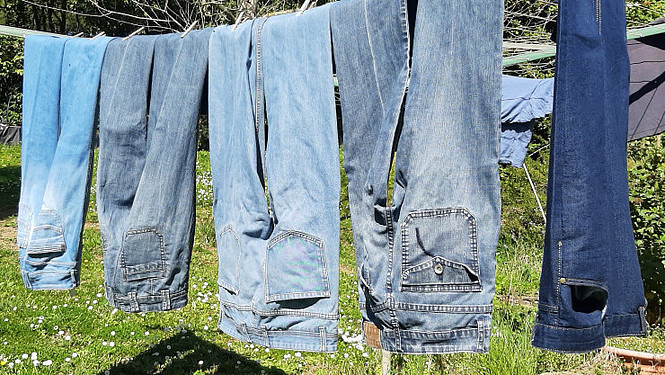 These companies are making big strides towards producing sustainable denim, so look out for these brands to be, and feel green. From upcycling and re purposing vintage Levi jeans to recycling the water that is used during dyeing and production, these brands are all making a difference.
These companies are making big strides towards producing sustainable denim, so look out for these brands to be, and feel green. From upcycling and re purposing vintage Levi jeans to recycling the water that is used during dyeing and production, these brands are all making a difference.
This is what you need to know about denim before you buy your next pair of denim jeans or denim jacket.
This post contains affiliate links and I will be compensated if you make a purchase after clicking on my links, without any additional cost to you. It helps me to maintain this website and bring you more eco friendly and sustainable news.
How Do You Know Your Denim Is Sustainable?
Organic cotton jeans are sustainable, but which other factors determine the sustainability of a material? These are the six parameter that are currently being used:
- Energy consumption and carbon dioxide emissions.
- The amount of water that is used.
- How the ground is used.
- The use of chemicals.
- Relationship with biodiversity.
- Production of solid residues.
Why Are Jeans Notoriously Bad For The Environment?
Apart from cotton production that is the dirtiest crop in the world, one of the aspects of denim production that makes it not sustainable, is the dyeing process and the amount of water that is used. Conventional methods use from 1,500 to 7,000 liters of water to produce a single pair of jeans.
Most denim producers use synthetic dye to color the denim fabric. The distinctive blue color, indigo, that is used in the manufacturing of denim, does not easily adhere to the denim fabric. This means that a huge amount of water and electricity is used to repeat the process of dyeing and washing the fabric several times.
Eco Friendly Indigo Color
Pure Indigo Flow is an aniline-free indigo for denim that was developed by Archroma. 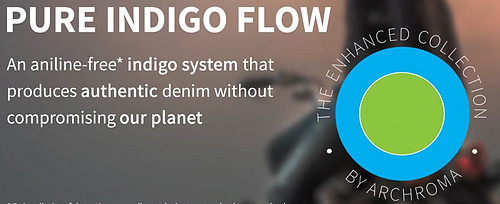 Synthetic indigo dye contains aniline, which is difficult to wash out of denim fabric, as it stays locked in the indigo pigment. During dyeing, the aniline impurities are discharged into the water, which ends up in our water ways.
Synthetic indigo dye contains aniline, which is difficult to wash out of denim fabric, as it stays locked in the indigo pigment. During dyeing, the aniline impurities are discharged into the water, which ends up in our water ways.
Aniline is toxic to aquatic life and harmful to factory workers that are exposed to it, so it is important to use alternatives.
If you would like to know which brand is using this technology, Patagonia is using it for indigo color in their denim fabric and this is where you can explore it.
Jeanologia has developed E-flow technology (nano bubble) in denim washing, thereby eliminating waste and damaging emissions which guarantees zero environmental contamination. This technology is used to transfer the indigo color onto the fibers and fabrics. Air becomes the carrier for the fabric dye, thereby reducing the amount of water that is required.
Karl Meyer and Greendye – Greendye is applying the indigo color in a nitrogen atmosphere, which needs less water and chemicals and a smaller dye bath. Warp is dipped into indigo and goes into a nitrogen chamber. Due to the lack of oxygen, oxidation cannot take place, which results in a higher penetration of the indigo color. The indigo forms a better bond with the cotton fiber.
Nitrogen technology increases the “take up” by up to three times, compared with conventional dyeing baths. Saving water and chemicals (more than fifty percent fewer chemicals are used to “fix” the indigo color). Higher fixation of the indigo color means less washing during the process, thus saving water and chemicals.
Read more about organic cotton jeans and water saving technologies that are already being used, in this article.
Additional processes like stone washing, sandblasting and bleaching, are used to give jeans their “lived in” look. These treatments all leave a very large carbon footprint. “No Stone” is a new stone washing technology for denim.
With many fashion addicts increasingly requesting sustainable denim, designers and stylists are also demanding fibers and production methods that will not harm the environment. These might not be cheap jeans, but they do look after the planet.
1. Wrangler
Indigood is a process of dyeing denim by using foam to transfer the trademark indigo color onto yarn and the denim fabric.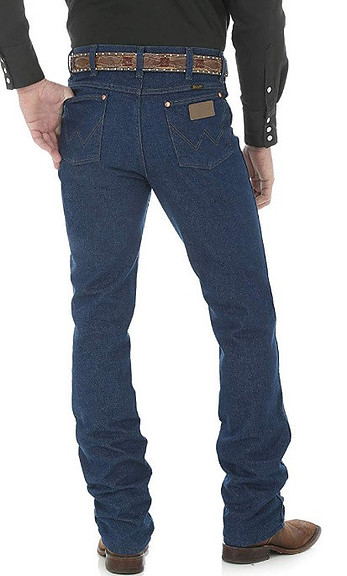 Wrangler started integrating this revolutionary new eco friendly process of dyeing denim, in June 2019.
Wrangler started integrating this revolutionary new eco friendly process of dyeing denim, in June 2019.
Recycled denim is obtained from pre-consumer denim waste from around the world. Wrangler breaks down the fibers to produce recycled cotton. New yarn is created by re-spinning the recycled cotton and mixing it with other cotton. The new yarn contains twenty-eight percent recycled cotton.
Conventional dyeing means that the yarn is dipped, up to ten times, into the dye bath. This take place in a machine that is one hundred meters long. By using Indigood technology, this has been changed to a machine that is only two meters long. The process no longer uses water, but foam, to transfer the indigo color onto the fibers.
After dyeing, the yarn is woven into denim fabric. The denim is then cut and sewn into the iconic Wrangler garments.
To get the denim look, it is finished using a process that uses nano bubbles and ozone technology. Laser finishing is used to add abrasions and gives it the “lived in” look.
The process reduces the amount of water that is used by one hundred percent, as water is eliminated from the dyeing process. Waste water is also virtually eliminated. The use of energy and other waste is reduced by more than sixty percent, compared with conventional denim dyeing techniques.
Wrangler has introduced the Indigood process into its various production sites, which should mean a water saving of 5.5 billion liters for the fashion group by 2024.
By using the Indigood technique, it means that a more sustainable pair of jeans or denim garment can be produced, providing you with a tough denim that has a gentle footprint. Get your Wrangler jeans at the best price here.
2. Levi’s
When it comes to fashion and style, Levi is a cornerstone of American made jeans. Levi is an American brand that was founded in 1873 and today has shops and outlets in more than one hundred and ten countries around the world.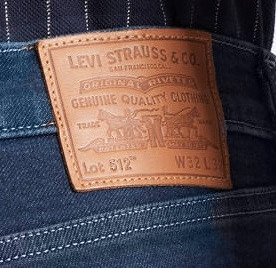
Their iconic Levi 501 jean was first launched in 1873, featuring a button fly, 5 pockets and an All-American look.
Denim production is notorious for requiring huge amounts of water to create just one pair of jeans. Levi’s new collection uses WaterLess technology, thereby drastically reducing the amount of water and energy that is used. WaterLess means that new finishes are created that require less water than conventional methods. Water is also recycled and reused during production.
So far more than 129 million liters of water has been recycled and more than 1.8 billion liters have been saved. The goal is that by 2020, eighty percent of Levis garments will be made using WaterLess technology.
Cotton that is used for Levi jeans comes from the Better Cotton Initiative, with the goal that by 2020, all their cotton would be sourced from sustainable practices.
The company has launched Levis Authorized Vintage Collection and is reducing their environmental impact by re purposing previously loved Levis. It means that old denim gets a new life and also looks great.
They have formed a partnership with Re/Done, a brand that remasters and upcycles vintage Levi jeans.
For those who value quality, craftsmanship, utilitarian and functional use, fashion and style, you cannot go wrong with a pair of Levi jeans. Get your pair of iconic Levi 501 jeans here.
3. Re/Done
Look no further if you want a unique pair of jeans.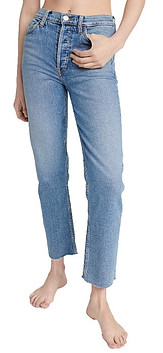 Re/Done is a luxury label that was founded in 2014 and is based in Los Angeles, USA. They regard themselves more than just a brand, but rather a movement to create sustainable fashion.
Re/Done is a luxury label that was founded in 2014 and is based in Los Angeles, USA. They regard themselves more than just a brand, but rather a movement to create sustainable fashion.
Re/Done upcycles vintage Levi jeans and used denim, to create limited quantities of unique jeans. Fabric for their new jeans are re purposed from vintage Levis, by taking it apart at the seams. Each pair is hand-picked, cut by hand and sewn.
A pair of vintage Levis has a story to tell, and it is upcycled to create a unique new piece.
With Re/Done you get a pair of modern jeans with vintage character. No harsh chemicals are used during the reconstruction and water saving practices are used.
A range of tops, shorts and jackets, all made from old denim garments and vintage Levi jeans, are available. They also have collaborations with The Attico and Oliver Peoples to re purpose their products.
Get your unique pair of ReDone jeans here
4. Reformation
The brand was started in 2009 with the aim to prove that sustainable fashion is possible. The buy leftover fabric and denim from other designers to make new jeans, including re purposing and upcycling vintage Levis.
Read more about Reformation in this post.
5. AYR
AYR was founded in 2014 and stands for All Year Round. It is a luxury brand that does not chase fast fashion. 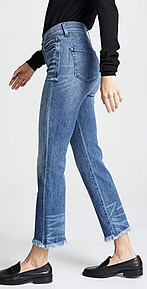 They believe modern women would skip the quick trends and rather build a wardrobe with classic pieces that are well-made and fit well.
They believe modern women would skip the quick trends and rather build a wardrobe with classic pieces that are well-made and fit well.
Their capsule wardrobe has a tailored and classic look and the items take up to a year to perfect the fabric and the cut. AYR produces made to last basics in luxurious materials.
They have designed what is known as the perfect pair of skinny jeans, that will not sag and lose shape when you wear it. These sexy jeans are made in Los Angeles and styled in NYC, so if you want a pair of American made jeans, these would fit the bill.
Denim textile is obtained from the Italian company ISKO and it contains a mix of reused and/or recycled denim. Lyocell is incorporated to add softness and drape.
The jeans are all available in different inseam lengths, so you can choose your perfect pair for your height.
Whether you want blue jeans or the best fit sexy black jeans, AYR has the complete range. And they might not be cheap jeans, but they sure look after the environment. Get you AYR jeans at the best price here.
6. Warp & Weft
Warp and Weft is a family owned business that has been going for more than three generations. They make their own denim textiles from scratch and the fibers that are used include cotton, Tencel and Lycra. 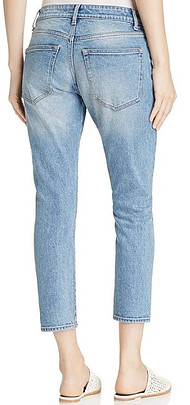
The denim fabric is made in different weights, from 7oz to 15oz, enabling them to use it in different applications and ranges.
Their goal is to make denim jeans great for not just everybody, but also for every body, so they produce jeans in sizes from 00 to 24.
Their own factory has an in-house water treatment plant, which means they can treat and recycle 98 percent of the water that is used. This means that less than ten gallons of water is used to make a pair of Warp and Weft jeans. Conventional methods use in the region of 1,500 gallons to produce one pair of denim jeans.
To avoid toxic chemicals, they use Cutting-Edge Dry Ozone Technology and eco friendly indigo dye. Solar energy is used to supply power to all the operations in the factory.
They control their whole production process and can therefore sell their sustainable denim at fair prices. By using a vertical operation, they are cutting out middle men and third parties, and can therefore bring you your pair of Warp and Waft quality jeans at an affordable price.
Order your pair of Warp and Weft jeans here.
7. Rehash
ReHash is a brand that belongs to the Italian group FG1936 srl. 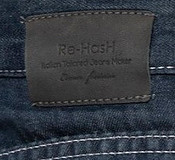 They are launching a sustainable denim range with eight garments under the new label “ReHash – Rethink – Recycle – Reduce”.
They are launching a sustainable denim range with eight garments under the new label “ReHash – Rethink – Recycle – Reduce”.
The best certified organic cotton, polyester cotton and recycled elastane have been selected for the denim. Tencel, a bio-degradable cellulose fiber, will also be used.
A small green leaf, a symbol of respect for nature, will be embroidered on the side. The collection will be launched later in 2020.
8. Boyish Jeans
This sustainable women’s line is designed in Los Angeles and focus on quality and fit. So if you want American made, sexy jeans, this is another brand to support. 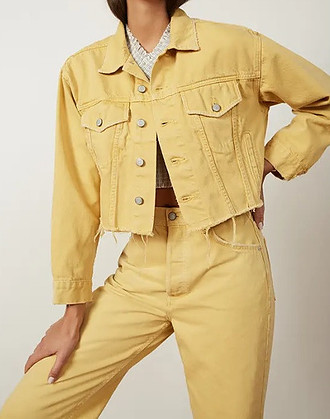
They work only with recycled fabrics and materials and incorporate sustainable fabrics through using environmentally friendly processes. Thirty percent recycled cotton and waste metal scraps are used to create buttons and rivets.
Their production process uses a third of the amount of water that would normally be used to produce a pair of jeans. Also, recycle all the water that is used, so no pollution of our waterways.
Standards that their garments are certified for include these:
- OEKO-TEX confidence in textiles Standard 100
- GOTS (Global Organic Textile Standard)
- Sustainable Brand Remake Approval
- GRS (Global Recycled Standard)
- Organic 100 Content Standard
- ISO 9001 Certified
And denim doesn’t always have to be blue! A beautiful range of other colors, rather than just indigo colour, is available.
They have formed a collaboration with One Tree Planted, which means that for every purchase that is made, one tree will be planted.  Get your Boyish Jeans garments here.
Get your Boyish Jeans garments here.
Denim is now greener, and more and more eco conscious denim brands are using recycled materials and sustainable practices to produce their jeans and denim garments. Cheap jeans are what it says, cheaply made and often without regard for the workers and environment.
If you prefer organic cotton jeans, then explore the 10 best brands here.
If you have any questions or comments about sustainable denim or indigo color processes that are used, please leave them below and I will get back to you.


I love the way you emphasized it, cheap and sustainability does not go hand in hand. Many time, it take some extra effort to produce quality that is sustainable and this cannot be cheap. I am not surprised to see Wrangler topping your list amidst the 8 best jeans brand, they have been around for long and known to use best in the industry technology to produce quality material
Many of these brands have been around for many years and the list is not in any particular order. Sustainability often comes with a higher price tag, but is certainly far better for the environment.
The shift towards the realisation that a lot more needs to be done to ensure that we keep our environment more safe is what is driving us towards getting more and more eco friendly products all around. To be very honest, I really like all I have seen here and the fact that I have 80% of all my jeans to be of Levi’s products makes me feel more relaxed here. thanks
We can all do more to ensure that we do not do any more harm to the environment. We have to look after our natural resources and protect it and not add to any more waste and pollution. These denim brands are all working towards achieving that goal.
Wow! I really did not realize how much water goes into one pair of jeans. The information you have provided is interesting and you have me. I will start buying green jeans from now on! We have to do all we can to keep our planet going for future generations. I am glad to see I can still buy my go to jeans, Wrangler and Levi but I am interested in the Boyish Jeans.
It is frightening to see how much water is used when making a pair of jeans. Thankfully there are brands that are working towards sustainable dyes and practices to help the environment.
Wow, these jeans are super awesome. Right from my childhood I had loved Levi because that’s my father’s favorite and during Christmas seasons he always get us at least two of Levis jeans and since then it as been my favorite also.
Thanks for sharing this with me, I will check out some nice jeans.
Hi there, yes it is possible to have an awesome pair of denim jeans that are also sustainable.
This was an eyeopener. I did not know that non-organic cotton production was the dirtiest crop in the world. I checked the info in your other article about cotton, and now it makes sense why it is indeed a very dirty and contaminated crop. I actually have a cotton tree on my land, it is still small, but it is growing nicely, they are beautiful trees.
The amount of water that is used to dye jeans is incredible. It is not surprising, though, since many of the same amounts are used for other products that are offered in stores … but I did not know that jeans was one of those products.
I’m glad that Wrangler is among the ecofriendly jeans, because I like Wrangler jeans. Although Levis is the nr. 1 brand, and I like them too, I just love Wrangler jeans. I have not heard of Re-Done, but they seem to have pretty designs, I like the jeans in the photo. Boyish Jeans looks great too, and it’s wonderful that they are participating in the Plant-a-Tree initiative.
Next time I buy a pair of jeans, it will definitely be one of those. Thanks for the info!
Hi Christine, I’m pleased to hear that you have learnt from this post. Jeans are such a staple garment and it is great to know that there are now sustainable options available.
I can honestly say, “I had no idea!” I assume I have had a deaf ear to what the fashion industry does to thb\e planet. Thank you for pointing out the damage and making me aware so I can do my small part to protecting the planet. I love to work with denim for recycling and have seen many brands in my collection. I must say I could not tell the difference! We have to be more responsible and check this stuff out for ourselves.
That it took so much water was a surprise, until I remember the water used in cotton irrigation while I was growing up on the farm. For some reason, those two processes had not merged in my mind. Thank you for changing my outlook. This makes me wonder how many more ways I am harming the environment without knowing it?
Thanks for sharing your information with me, Sami
Hi Sami, thank you for your kind comments. It is frightening how wasteful the fashion industry is and most people are not aware of it, so if we can get the message out there, it will help.
Nice review and very educative. Jeans are in indeed notoriously bad for the environment. It produces a lot of pollution to the environment and your article critically analysis this menace. If conventional methods use from 1,500 to 7,000 liters of water to produce a single pair of jeans, one can imagine the waste consumption of water use in the process. We need to conserve our resources and as far as am concern, cutting down the production of jeans can be a solution to this. Nice post. Thanks for sharing.
Thank you and the way forward with sustainable denim production, is to use water saving procedures and sustainable fibers. That is now available, with more manufacturers going the green route.
I never knew that blue jeans were considered bad for the environment. I am glad to see some companies starting to make jeans that are better for all of us. My daughter loves wearing blue jeans, she has always worn Levi’s, do the ones that use the Waterless technology tell you on the tag? I would love to support this idea, it sounds like it will be great for the planet.
Hi Travis, The fashion industry is the biggest polluting industry and all the initiatives like saving water, recycling and upcycling and leaving a smaller carbon footprint, will help our planet. If your daughter loves Levis, then vintage Levi jeans that are repurposed might be just up her street.
This is a great article! I love jeans and I used jeans all my life. It is my favorite clothing.I have probably polluted the planet with a lot of my jeans. I think your article is very informative, but also important in terms of change to a greener economy and world. It made me really think about the small changes each and everyone of us can do to create a greener and more eco friendly world. I had no idea about the indigood process before I read your article and it is very helpful for me next time I will buy a pair of jeans. Your article bring awareness about daily products many people use. I will definitely share your article with my friends. I will definitely ask if the jeans I am buying are using the indigood process. Thank you for an eye- opening and very helpful article.
Hi Hilde, fashion and style and a good pair of jeans go hand in hand, and is a must in every wardrobe. It is very encouraging that more sustainable and eco friendly options are now available to the discerning consumer. Labels on products are also clearer in terms of processes that were followed, so look out for that when chosing your next pair of “green” jeans.